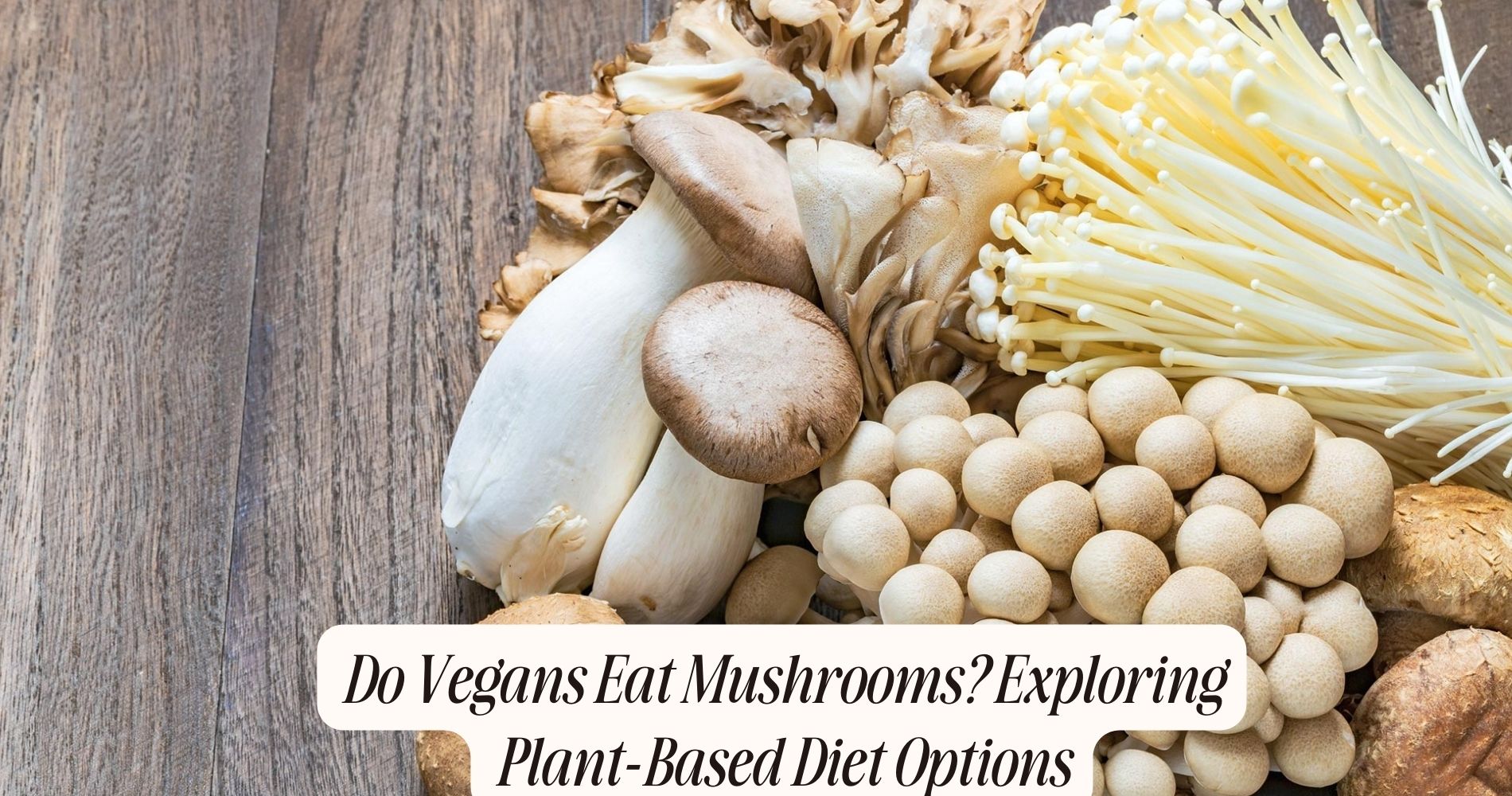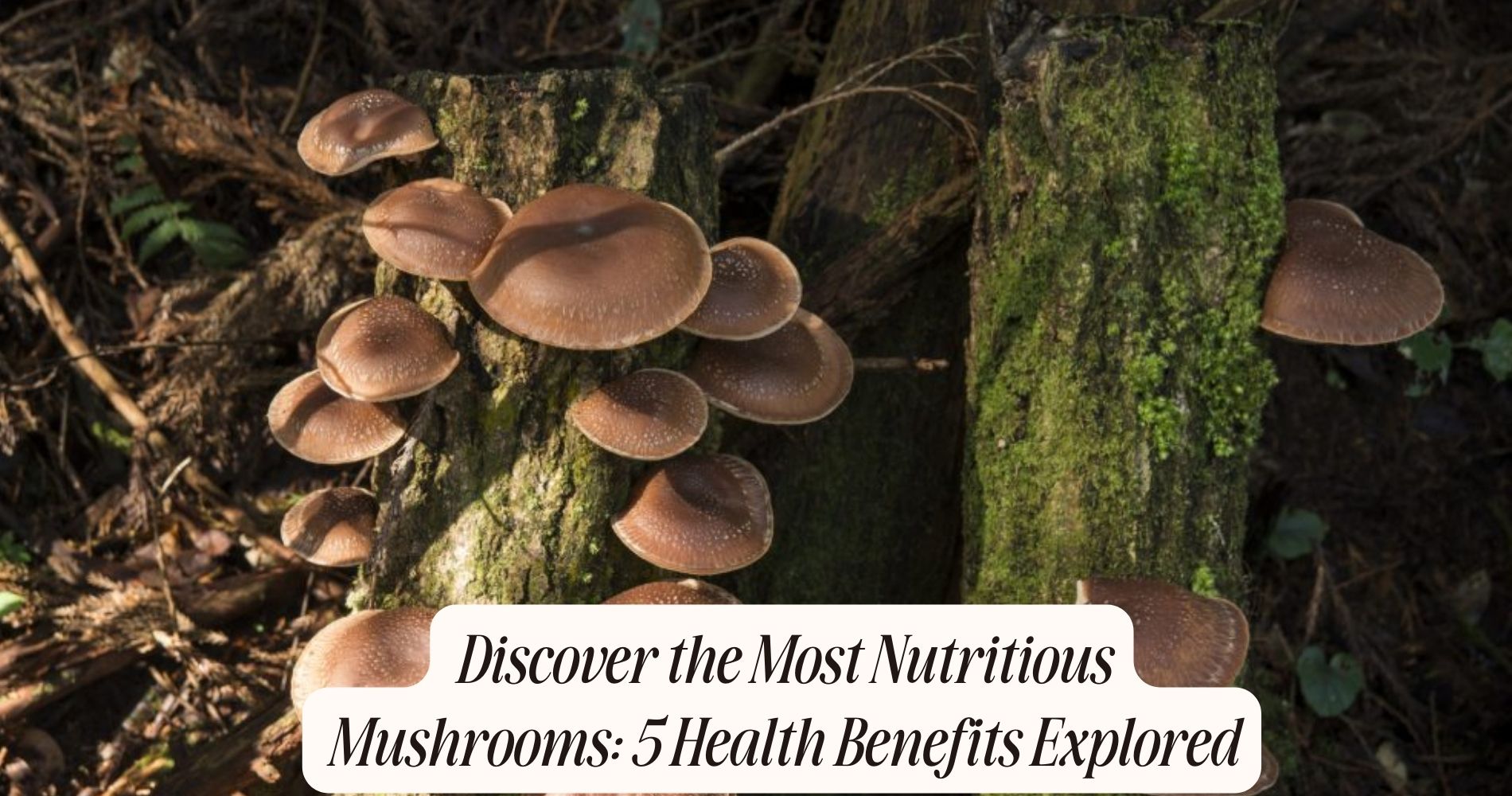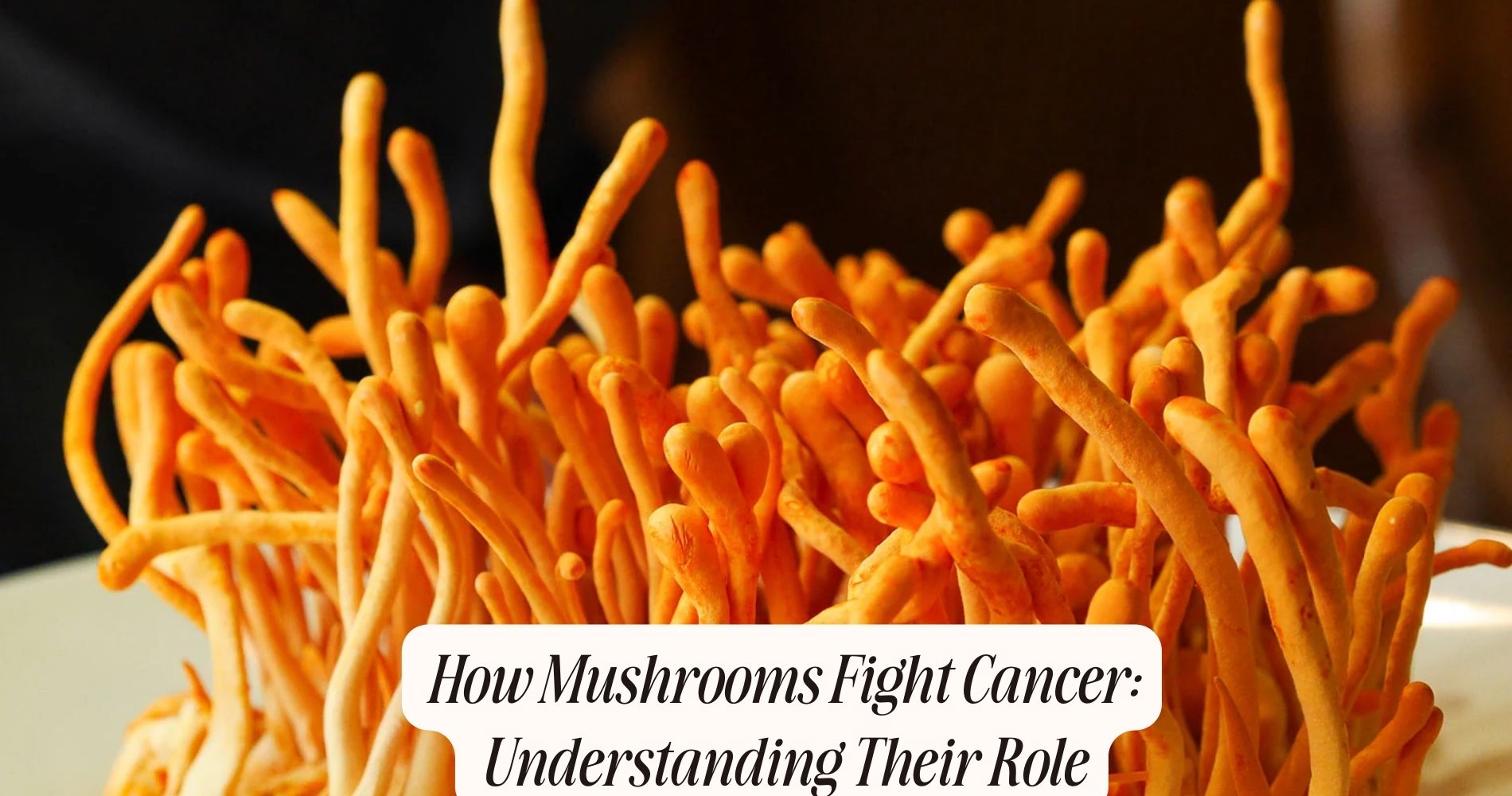
Do Vegans Eat Mushrooms? Exploring Plant-Based Diet Options
Do vegans eat mushrooms? Yes, vegans eat mushrooms since they're packed with nutrients and fit perfectly into plant-based diets. Mushrooms, such as shiitake, portobello, and oyster, offer rich flavors, unique textures, and essential vitamins like B vitamins, vitamin D, and minerals like selenium and potassium. Low in calories and high in fiber, mushrooms support digestive health and satiety. Their versatility allows various cooking methods—grilling, sautéeing, roasting—enhancing both nutritional value and taste. Including mushrooms in your vegan diet can improve overall well-being and reduce environmental impact. To discover more about how to incorporate this nutritious food into your lifestyle, keep exploring.
Understanding Veganism
Understanding veganism begins with recognizing that it's a lifestyle choice centered around excluding all animal products for health, ethical, and environmental reasons.
When you consider the ethical considerations, the focus is on animal rights. Vegans believe that animals shouldn't be exploited for food, clothing, or any other purpose. This perspective is supported by organizations like PETA, which highlight the suffering and poor conditions animals often endure in industries such as factory farming.
From a health standpoint, numerous studies suggest that a vegan diet can lower your risk of chronic diseases like heart disease, diabetes, and certain cancers. Rich in fruits, vegetables, nuts, and grains, vegan diets are typically high in fiber and low in saturated fats. This combination can improve your overall health and promote longevity.
Environmental concerns also play a significant role. Animal agriculture is a leading cause of deforestation, greenhouse gas emissions, and water pollution. By choosing a vegan lifestyle, you're contributing to a more sustainable planet.
Evidence from the United Nations Food and Agriculture Organization indicates that reducing meat consumption is essential for mitigating climate change and preserving natural resources.
What Are Mushrooms?
Exploring plant-based diet options, mushrooms stand out as a versatile and nutrient-rich food that can seamlessly replace animal products in various dishes. Classified under the kingdom Fungi, mushrooms are neither plants nor animals. Their unique fungal classification sets them apart in the culinary world, offering distinct textures and flavors that cater to a range of dietary needs.

When diving deeper, you'll find a wide array of edible varieties of mushrooms, each with its own unique characteristics. Common types include button mushrooms, which are mild and versatile, and shiitake mushrooms, known for their robust, earthy flavor. Oyster mushrooms, with their delicate texture, and portobello mushrooms, often used as a meat substitute due to their thick, hearty caps, also make frequent appearances in vegan recipes.
Mushrooms' adaptability in cooking is remarkable. You can grill, sauté, roast, or even blend them into sauces and soups. Their ability to absorb flavors makes them an excellent addition to various dishes, enhancing both taste and nutritional value.
As you explore different varieties, you'll discover mushrooms can add depth and richness to your plant-based meals, making them a staple in vegan diets.
Nutritional Value
How do mushrooms stack up nutritionally? You'll find they offer a robust vitamin content and an impressive mineral profile, making them a valuable addition to any plant-based diet.
Mushrooms are particularly rich in B vitamins like riboflavin, niacin, and pantothenic acid, which are essential for energy production and maintaining cognitive health. They're also one of the few non-animal sources of vitamin D when exposed to sunlight or UV light, a vital nutrient for bone health and immune function.

In terms of minerals, mushrooms don't disappoint. They're a good source of selenium, an antioxidant that helps protect your cells from damage. Additionally, they contain copper, which supports red blood cell production, and potassium, essential for maintaining healthy blood pressure and proper muscle function. Iron, another key mineral found in mushrooms, plays a critical role in oxygen transport and energy production.
Moreover, mushrooms are low in calories and fat while being high in dietary fiber, which promotes digestive health and helps you feel full longer. With this combination of vitamins, minerals, and other beneficial compounds, mushrooms are a powerhouse addition to your vegan diet, contributing to overall well-being and nutritional balance.
Culinary Uses
When you incorporate plant-based ingredients into your meals, you can utilize them as versatile recipe components that enhance flavors and boost nutritional content.
Techniques like roasting, fermenting, and blending can greatly amplify taste while preserving essential vitamins and minerals.
Additionally, nutrient-rich preparations guarantee you're not only enjoying delicious dishes but also supporting your overall health.
Versatile Recipe Ingredient
Using versatile plant-based ingredients in your recipes not only enhances flavor but also boosts nutritional value. Mushrooms are a prime example, offering a range of varieties like shiitake, portobello, and cremini, each bringing unique textures and nutrients to your meals. They're rich in antioxidants, vitamins, and minerals, making them an excellent choice for a balanced diet.

Different cooking methods can further elevate the benefits and flavors of mushrooms. Sautéing mushrooms in a small amount of olive oil helps retain their nutrients while adding a pleasant caramelized taste. Grilling portobello mushrooms can serve as a delicious, meat-free burger alternative, providing a smoky flavor and satisfying bite.
Roasting varieties like shiitake or cremini enhances their earthy flavors, making them a perfect addition to salads or grain bowls. Steaming is another healthy option that preserves most of the mushrooms' nutritional content. Incorporating mushrooms into soups or stews can also enhance the dish's nutritional profile while providing a hearty, umami taste.
Flavor Enhancement Techniques
To enhance the flavors in your plant-based dishes, consider incorporating techniques like marinating, seasoning with herbs and spices, and utilizing acid-based ingredients such as lemon or vinegar.
Marinating vegetables, particularly mushrooms, can work wonders for flavor. The process, known as marinade magic, involves soaking your ingredients in a mixture of oils, acids, and seasonings. This not only enhances taste but also improves texture, making your meals more satisfying.
For an umami boost, which is essential in plant-based cooking, mushrooms are your best friend. They contain natural glutamates, compounds that deliver that savory, meaty flavor. You can enhance this effect by using soy sauce, miso, or nutritional yeast in your recipes. These ingredients can elevate the umami profile of dishes like stir-fries, soups, and even salads.
Additionally, seasoning with fresh herbs and spices can make a significant difference. Herbs like rosemary, thyme, and basil add aromatic complexity, while spices such as cumin, paprika, and turmeric provide depth and warmth.
Using acid-based ingredients like lemon juice or vinegar can brighten flavors and balance richness, making your plant-based meals not only flavorful but also healthful.
Nutrient-Rich Preparations
Incorporating a variety of nutrient-dense ingredients into your plant-based meals guarantees you're receiving essential vitamins, minerals, and antioxidants while enjoying diverse culinary experiences.
Mushrooms, for example, are a powerhouse of nutrients. They're rich in B vitamins, selenium, and antioxidants, all contributing to overall health.
To maximize nutrient density, consider different cooking techniques. Sautéing mushrooms in a small amount of olive oil can maintain their nutrients, while adding garlic and onions boosts the meal's antioxidant profile.
Steaming mushrooms is another excellent method; it retains essential vitamins without adding unnecessary fats.

Fermentation is a lesser-known technique that enhances nutrient absorption. Fermented mushrooms can be a gut-friendly addition, providing probiotics that support digestive health.
You can also use mushrooms in broths and soups, where prolonged simmering extracts minerals and beneficial compounds.
Don't overlook the raw preparation of mushrooms in salads. This method maintains their full spectrum of nutrients, offering a fresh and crunchy texture.
Vegan-Friendly Criteria
When evaluating vegan-friendly criteria, you'll need to confirm that the food products contain no animal-derived ingredients and haven't been tested on animals. This means scrutinizing ingredient lists and understanding the origins of each component. Ethical considerations play a vital role in this analysis. For instance, you'll want to verify that no animal exploitation occurred during the production process.
Ingredient sourcing is equally significant. Many seemingly vegan foods might contain hidden animal products, like gelatin or certain food colorings derived from insects. It's crucial to identify these and opt for alternatives that align with vegan principles. For example, mushrooms are typically vegan-friendly as they're fungi and not processed with animal products.
Health-focused choices are also important when evaluating vegan foods. A balanced vegan diet should provide all necessary nutrients, which means you'll need to be aware of potential deficiencies, such as B12 and iron, and choose fortified foods or supplements accordingly.
Common Misconceptions
Despite growing awareness, many people still hold several misconceptions about plant-based diets, often leading to misunderstandings about their health benefits and nutritional adequacy. One prevalent diet myth is that plant-based diets lack sufficient protein. However, legumes, nuts, seeds, and whole grains are rich sources of protein, often providing all essential amino acids when consumed in variety.
Another common plant misconception is that vegans and vegetarians can't get enough iron or calcium. In reality, plant-based sources like leafy greens, tofu, and fortified plant milks offer ample amounts of these minerals. It's important to pair iron-rich foods with vitamin C sources to enhance absorption.
Many also believe that a plant-based diet is inherently expensive or time-consuming. However, staples like beans, rice, and seasonal vegetables can be both budget-friendly and quick to prepare.
Additionally, some think that plant-based diets are limited in variety and flavor. With global cuisines offering countless plant-based recipes, you have a world of flavors to explore. By debunking these diet myths, you can make more informed choices and appreciate the versatility and richness of plant-based diets, ensuring nutritional adequacy and enjoyment in your meals.
Health Benefits
Understanding the true nature of plant-based diets allows you to appreciate their numerous health benefits, including improved cardiovascular health and reduced risk of chronic diseases. When you consume a variety of fruits, vegetables, legumes, and whole grains, you're feeding your body with essential nutrients that support overall well-being.
Plant-based diets are rich in antioxidants and phytonutrients, which play an important role in immune support. These compounds help your body fend off infections and reduce inflammation. For instance, beta-glucans found in mushrooms can enhance the immune system by activating macrophages and natural killer cells, essential for your body's defense mechanisms.
Moreover, plant-based diets are often lower in calories and saturated fats, making them effective for weight management. High fiber content from plant foods improves satiety, helping you feel fuller longer and reducing overeating. Studies have shown that individuals following plant-based diets tend to have lower body mass indexes (BMIs) compared to those consuming animal products.
In addition, the abundance of potassium and magnesium in plant foods contributes to better heart health by regulating blood pressure. By focusing on a diverse range of plant-based options, you can harness these health benefits and maintain a balanced, nutritious diet.
Environmental Impact
Switching to a plant-based diet can notably reduce your carbon footprint, as plant farming typically generates fewer greenhouse gases than animal agriculture.
Additionally, sustainable farming practices involved in growing plants help conserve water and soil health, benefiting the planet's ecosystems.
Reduced Carbon Footprint
Switching to a plant-based diet can significantly decrease your carbon footprint, as plant agriculture typically requires fewer resources and emits fewer greenhouse gases compared to animal farming. By making eco-conscious choices, you contribute to significant emission reduction. Research shows that producing plant-based foods generates 10 to 50 times fewer greenhouse gas emissions than producing animal-based products.
For instance, the carbon dioxide equivalent of one kilogram of beef is approximately 27 kg, whereas that of legumes is just 2 kg.
Moreover, plant farming consumes substantially less water and land. Growing crops like vegetables, grains, and legumes uses about 80-90% less water compared to raising livestock. This not only conserves critical water resources but also preserves natural habitats often destroyed by animal agriculture. Reducing your reliance on meat and dairy means decreasing deforestation rates, which are major contributors to climate change.
Additionally, adopting a plant-based diet can improve your health by lowering the risk of chronic diseases such as heart disease, diabetes, and certain cancers. The benefits extend beyond personal health, aiding in the global effort to combat climate change.
Sustainable Farming Practices
Implementing sustainable farming practices can greatly reduce the environmental impact of agriculture, ensuring that food production is both eco-friendly and resource-efficient. By focusing on methods like crop rotation, reduced tillage, and organic fertilizers, you can improve soil health significantly.
Healthier soil not only produces more nutritious food but also sequesters more carbon, reducing greenhouse gases.
Organic certification standards emphasize avoiding synthetic pesticides and fertilizers, which can harm the environment. Instead, organic methods promote the use of compost and cover crops to maintain fertility and biodiversity. These practices improve soil structure and water retention, reducing the need for irrigation and minimizing runoff that can contaminate water supplies.
When you choose products with organic certification, you support farming practices that prioritize long-term soil health. This is essential because healthy soil is less prone to erosion and more resilient to climate change.
Additionally, sustainable farming practices often involve less energy-intensive techniques, further decreasing agriculture's carbon footprint.
Biodiversity Preservation
By adopting a plant-based diet, you can play a vital role in preserving biodiversity and reducing the environmental impact of food production. Plant-based diets require fewer resources like land and water compared to animal-based agriculture. This reduction in resource consumption helps maintain ecosystem diversity by allowing natural habitats to thrive.
When you choose plant-based foods, you support agricultural practices that are less intrusive to wildlife habitats, promoting wildlife conservation.
Studies have shown that areas dedicated to animal farming have notably higher rates of deforestation, which leads to a loss of biodiversity. By reducing the demand for meat, you help decrease deforestation rates, allowing forests to act as sanctuaries for countless species. This preservation of ecosystems ensures that various plants and animals can continue to coexist, maintaining a balanced environment.
Moreover, plant-based diets contribute less to pollution, which is another factor affecting ecosystem diversity. Animal farming produces high levels of greenhouse gases and waste products that contaminate soil and water bodies. By opting for plant-based options, you help reduce these pollutants, further aiding in wildlife conservation and promoting healthier ecosystems.
Your dietary choices can make a noticeable impact on the planet's health.
Supercharge Your Plant-Based Diet with SUPER MUSHROOM GUMMIES
For those exploring whether vegans can include mushrooms in their diets, consider enhancing your nutritional intake with Well Gummies' SUPER MUSHROOM GUMMIES. These gum chew-form gummies are an effortless way to incorporate the benefits of 10 different functional mushrooms into your vegan lifestyle. Crafted to fuel your brain and energize your body, these gummies provide calmer energy, sharper focus, and immune support, promoting a balanced body and a clear mind. Plus, they're flavored with fresh wild berries, making them as tasty as your favorite candy, but without any jitters or crashes. Ideal for vegans seeking to enrich their diet while enjoying sustained energy throughout the day.
Frequently Asked Questions
Can Vegans Consume Yeast or Yeast Extract?
Yes, you can consume nutritional yeast as a vegan, provided you don't have yeast allergies. It's a great source of B-vitamins and protein, enhancing your plant-based diet with essential nutrients.
Are Mushrooms Considered a Fruit or Vegetable?
Mushrooms aren't classified as fruits or vegetables; they're fungi. Their fungal classification distinguishes them, but their nutrient profile, rich in vitamins and minerals, makes them a healthy addition to any diet.
Do Mushrooms Have Any Unique Health Benefits for Vegans?
Yes, mushrooms offer unique health benefits for vegans. They provide antioxidant properties and are one of the few plant-based sources of vitamin D, which supports immune function and bone health. Include them in your diet for maximum benefits.
How Are Mushrooms Farmed Sustainably?
When you consider how mushrooms are farmed sustainably, indoor cultivation methods and waste recycling play a pivotal role. These techniques minimize environmental impact and promote efficient resource use, ultimately supporting your health-focused, plant-based diet choices.
Can Mushrooms Replace Meat in Terms of Texture and Flavor?
Yes, mushrooms can replace meat when it comes to texture and flavor. They're excellent meat substitutes due to their umami flavor, which mimics meatiness. Nutritionally, they're rich in vitamins and minerals, supporting a health-focused diet.
Conclusion
In exploring whether vegans eat mushrooms, you've seen that mushrooms are indeed a vegan-friendly, nutrient-rich option. They offer numerous health benefits, from boosting your immune system to providing essential vitamins and minerals.
Additionally, mushrooms are versatile in the kitchen and have a minimal environmental impact. Incorporating mushrooms into your plant-based diet can enhance your meals while supporting your health and sustainability goals.
So, don't hesitate to add these fungi to your vegan repertoire.




